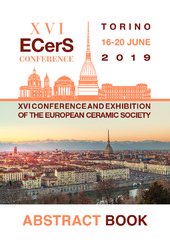Приказ основних података о документу
The effect of mechanical activation on synthesis and properties of MgAl2O4 ceramics
| dc.creator | Obradović, Nina | |
| dc.creator | Fahrenholtz, William G. | |
| dc.creator | Filipović, Suzana | |
| dc.creator | Kosanović, Darko | |
| dc.creator | Dapčević, Aleksandra | |
| dc.creator | Rogan, Jelena | |
| dc.creator | Pavlović, Vladimir B. | |
| dc.date.accessioned | 2020-01-09T13:33:07Z | |
| dc.date.available | 2020-01-09T13:33:07Z | |
| dc.date.issued | 2019 | |
| dc.identifier.uri | https://dais.sanu.ac.rs/123456789/7022 | |
| dc.description.abstract | Magnesium aluminate, MgAl2O4, and other alumina-based spinels are refractory ceramics with high hardness and resistance to chemical attack while also being possible microwave dielectrics. Pure MgAl2O4 can be optically transparent when fully dense. Spinels exhibit inversion, which results in disorder among occupancy of A and B site cations. The goal of this study was to examine the effects of mechanical activation and composition on the temperature required for spinel formation and the site occupancy in the resulting spinel. MgAl2O4 was produced by solid state reaction between MgO and alpha-Al2O3. The starting powders were mixed by ball milling to homogenize the powders without significant particle size reduction. Mechanical activation of mixed powders was performed in a high-energy planetary ball mill in air for 1 h. Powders were compacted at 300 MPa. Heat treatments were performed in air, at temperatures ranging from 1200 to 1500 °C with 2 h dwell time, to determine the amount of spinel formation as a function of temperature. Phase composition and microstructure of initial powders and heated samples were determined by means of X-ray diffraction, particle size analysis, and scanning electron microscopy. The influence of milling and consolidation parameters were studied by electrical measurements and mechanical characterization. The main results of this study were that mechanical activation for 60 minutes initiated a mechano-chemical reaction, and resulted in spinel formation at much lower temperatures than within non-activated powders. Microstructures of ceramics sintered below 1400 oC indicated that final stage sintering started at much lower temperatures for activated samples than for non-activated samples. Changes in microstructure parameters, as a consequence of mechanical treatment and subsequent heating of investigated powder mixtures, strongly affect electrical and mechanical properties of the final ceramics. | sr |
| dc.language.iso | en | sr |
| dc.publisher | Societa ceramica italiana | sr |
| dc.publisher | Politecnico di Torino | sr |
| dc.relation | info:eu-repo/grantAgreement/MESTD/Basic Research (BR or ON)/172057/RS// | sr |
| dc.rights | openAccess | sr |
| dc.rights.uri | https://creativecommons.org/licenses/by-nc-nd/4.0/ | |
| dc.source | Abstract Book / XVI Conference and Exhibition of the European Ceramic Society XVI ECerS Conference, Torino, 16-20 June 2019 | sr |
| dc.subject | mechanical activation | sr |
| dc.subject | sintering | sr |
| dc.subject | spinel | sr |
| dc.subject | magnesium aluminate | sr |
| dc.subject | MgAl2O4 | sr |
| dc.title | The effect of mechanical activation on synthesis and properties of MgAl2O4 ceramics | en |
| dc.type | conferenceObject | sr |
| dc.rights.license | BY-NC-ND | sr |
| dcterms.abstract | Филиповић, Сузана; Обрадовић, Нина; Фахренхолтз, Wиллиам Г.; Косановић, Дарко; Дапчевић, Aлександра; Роган, Јелена; Павловић, Владимир Б.; | |
| dc.citation.spage | 262 | |
| dc.citation.epage | 262 | |
| dc.type.version | publishedVersion | sr |
| dc.identifier.fulltext | https://dais.sanu.ac.rs/bitstream/id/27843/Obradovic_ECERS2019.pdf | |
| dc.identifier.rcub | https://hdl.handle.net/21.15107/rcub_dais_7022 |

